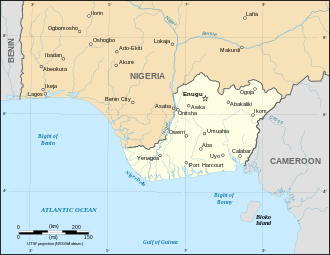The disquilibrium and perceived corruption of the electoral and political process led, in 1966, to several back-to-back military coups. The first coup was in January 1966 and was led by Igbo soldiers under Majors Emmanuel Ifeajuna and Chukwuma Kaduna Nzeogwu. It was partially successful; the coup plotters murdered Prime Minister Abubakar Tafawa Balewa, Premier Ahmadu Bello of the Northern Region and Premier Ladoke Akintola of the Western Region. But, the coup plotters struggled to form a central government. President Nwafor Orizu handed over government control to the Army, then under the command of another Igbo officer, General JTU Aguiyi-Ironsi.
Later, the counter-coup of 1966, supported primarily by Northern military officers, facilitated the rise of Lt. Colonel Yakubu Gowon to head of state. This sequence of events led to an increase in ethnic tension and violence.
In May 1967, the Eastern Region declared independence as a state called the Republic of Biafra, under the leadership of Lt Colonel Emeka Ojukwu. The Nigerian Civil War began as the official Nigerian government side (predominated by soldiers from the North and West) attacked Biafra (Southeastern) on 6 July 1967 at Garkem. The 30 month war, with a long siege of Biafra and its isolation from trade and supplies, ended in January 1970. Estimates of the number of dead in the former Eastern Region are between 1 and 3 million people, from warfare, disease, and starvation, during the 30-month civil war .
France, Egypt, the Soviet Union, Britain and others were deeply involved in the civil war behind the scenes. Britain and the Soviet Union were the main military backers of the Nigerian government while France and others aided the Biafrans. Nigeria used Egyptian pilots for their air force.
WIKIPEDIA


No comments:
Post a Comment